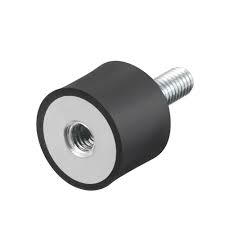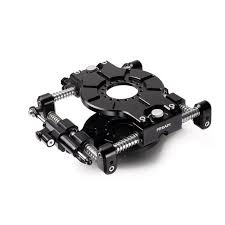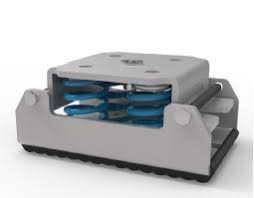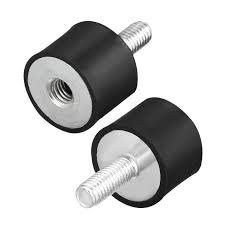Pipe support vibration isolators are crucial components in industrial settings to minimize the transmission of vibrations and noise from pipes to surrounding structures. The design and installation of efficient pipe support vibration isolators are essential to ensure the smooth rubber vibration isolator mounts operation of industrial systems and to prevent damage to equipment and structures. In this article, we will discuss the key considerations and best practices for designing efficient pipe support vibration isolators for industrial use. We will explore the various factors that need to be taken into account, including the type of pipe support, material selection, and installation methods, to achieve optimal vibration isolation performance.
Designing efficient pipe support vibration isolators for industrial use involves carefully considering factors such as the type of piping system, the specific vibration frequencies to be isolated, and the environmental conditions the isolators will be vibration isolator mounts exposed to. It is essential to select the right materials and designs to effectively minimize vibration transmission and prevent damage to the piping system. Engineers may utilize various techniques, such as analyzing dynamic properties, conducting finite element analysis, and testing prototypes to ensure the effectiveness of the isolators. Additionally, considerations for ease of installation and maintenance are also important to minimize downtime and ensure long-term reliability.
Designing efficient pipe support vibration isolators for industrial use involves detailed analysis and understanding of the specific application. Various factors such as the type of piping system, the frequencies and amplitudes of vibrations, and environmental conditions must be taken into account. Engineers typically utilize advanced tools and techniques, including finite element analysis and dynamic property testing, to develop isolators that effectively minimize vibration transmission and prevent damage to the pipe system. Considerations for ease of installation, maintenance, and long-term reliability are floor mount vibration isolator also essential in the design process. Material selection and design optimization play a crucial role in achieving the desired level of vibration isolation for industrial pipe support systems.
Understanding the Importance of Pipe Support Vibration Isolators

Pipe support vibration isolators are important in order to reduce the transmission of vibration and noise from piping systems to the surrounding structure. They help to minimize the impact of vibration on the piping system itself as well as on nearby equipment and structures. These isolators are typically made from rubber or neoprene materials to absorb and dampen the vibrations generated by the piping system. By doing so, they help to prevent damage to the piping, valves, and other components, while also reducing the potential for noise and vibration transfer to the surrounding environment. Properly designed and installed pipe support vibration isolators can also help to extend the lifespan of the piping system and reduce maintenance costs over time. They are particularly important in situations where there are sensitive nearby components or structures that could be negatively affected by vibration and noise. Overall, understanding the importance of pipe support vibration isolators is crucial for ensuring the efficient and effective operation of piping systems, as well as for maintaining a comfortable and safe environment for workers and occupants in the vicinity.
The Advantages of Using Pipe Support Vibration Isolators in Industrial Settings
hvac vibration isolation

Pipe support vibration isolators offer several advantages in industrial settings. These isolators help to reduce vibration and noise levels, which can improve the overall working environment and protect sensitive equipment from damage caused by excessive vibrations. Additionally, pipe support vibration isolators can help to prolong the lifespan of piping systems and equipment by reducing the stress and strain caused by constant vibration. They also provide a cost-effective solution for addressing vibration issues, as they require minimal maintenance and can be easily installed in various types of industrial settings. Overall, using pipe support vibration isolators can lead to improved efficiency, reduced maintenance costs, and a safer work environment in industrial facilities.
Selecting the Right Pipe Support Vibration Isolators for Your Application

Selecting the right pipe support vibration isolators involves considering factors such as the type and size of the pipe, the operating conditions (temperature, pressure, flow rate), and the potential sources of vibration. It is important to choose isolators that can effectively dampen vibrations while also providing the necessary support for the pipe. Additionally, considering the material and environmental factors is crucial to ensure the isolator's longevity and performance. Proper installation and maintenance are also key factors in ensuring the effectiveness of the chosen isolators for your specific application. Consulting with a vibration isolation specialist can help in selecting the most suitable isolators for your needs.
Common Types of Pipe Support Vibration Isolators and Their Features

1. Spring Hangers: These pipe support vibration isolators consist of a spring mechanism that absorbs and isolates vibration from the piping system. They are commonly used in industrial applications where there is a need to minimize the transfer of vibration to the surrounding structure. 2. Neoprene Mounts: Neoprene mounts are made of a resilient rubber material that provides excellent vibration isolation for pipes and equipment. They are suitable for applications where there is a need to minimize noise and vibration transmission. 3. Rubber Pads: Rubber pads are simple and cost-effective vibration isolators that can be used to support and isolate piping systems. They are often used in HVAC and plumbing applications to reduce vibration and noise. 4. Vibration Dampers: Vibration dampers are often used in high-performance applications where there is a need to minimize vibration and shock. They typically consist of a spring or elastomeric element that absorbs and dissipates energy from the piping system. 5. Sway Braces: Sway braces are used to control the movement and vibration of piping systems caused by thermal expansion, seismic activity, or other external forces. They provide support and stability to the piping system while allowing for movement and flexibility.
How to Properly Install and Maintain Pipe Support Vibration Isolators
Pipe support vibration isolators should be properly installed to ensure they are effective in reducing vibration and noise transmission. Isolators should be selected based on the size and weight of the piping system, as well as the type of vibration being experienced. Proper installation involves securely attaching the isolator to the pipe support and ensuring it is aligned with the pipe. Regular maintenance should include inspecting isolators for signs of wear or damage, as well as checking for proper alignment and function. Additionally, it is important to follow manufacturer guidelines for maintenance and replacement of isolators to ensure they continue to effectively reduce vibration.
Maximizing Efficiency and Minimizing Damage with Pipe Support Vibration Isolators
Maximizing efficiency and minimizing damage with pipe support vibration isolators is crucial for maintaining the structural integrity and longevity of piping systems. These isolators are designed to absorb and dissipate vibrations caused by machinery, equipment, or environmental factors, reducing the risk of fatigue failure and prolonging the life of the piping. By effectively managing vibrations, these isolators can also improve operational efficiency by reducing downtime and maintenance costs. Proper selection and installation of pipe support vibration isolators are essential for ensuring optimal performance and protection of the piping system.
The Role of Pipe Support Vibration Isolators in Preventing Structural Fatigue
Pipe support vibration isolators play a crucial role in preventing structural fatigue by effectively absorbing and dissipating any vibrations that may be transmitted through the piping system. These isolators are specifically designed to reduce the impact of vibrations on the surrounding structures, thereby minimizing the potential for fatigue failure. By installing pipe support vibration isolators, the dynamic loads and stresses caused by vibration are significantly reduced, ultimately extending the service life of the piping system and preventing costly structural damage. These isolators are commonly used in a wide range of industrial and commercial applications, including HVAC systems, power plants, and manufacturing facilities, where vibration control is essential for the safety and integrity of the overall infrastructure. In essence, the role of pipe support vibration isolators in preventing structural fatigue cannot be understated, as they provide an effective means of protecting critical assets and ensuring the long-term reliability of piping systems. Proper selection and installation of these isolators are essential for achieving optimal performance and avoiding potential issues related to structural fatigue.
Innovations in Pipe Support Vibration Isolator Technology for Modern Industries<
hvac vibration isolation/h2>
Innovations in pipe support vibration isolator technology for modern industries have revolutionized the way in which equipment and piping systems are supported and protected from vibration. These advancements have led to the development of a wide range of vibration isolator products that are designed to meet the unique needs of various industries, including HVAC, power generation, oil and gas, and industrial manufacturing. Modern pipe support vibration isolators are now available in a variety of materials, including rubber, neoprene, and spring-based systems, with each offering specific benefits and capabilities. These isolators are designed to effectively reduce vibration, noise, and shock in piping systems, improving overall system performance and prolonging the lifespan of equipment. Furthermore, the development of computer-aided design (CAD) and finite element analysis (FEA) has allowed for more accurate and efficient design and customization of vibration isolators to meet the specific requirements of different applications. This has resulted in the ability to tailor isolator solutions to a wider range of operating conditions, including extreme temperatures, corrosive environments, and high-pressure systems. Overall, these innovations in pipe support vibration isolator technology have significantly improved the reliability and performance of industrial piping systems, offering enhanced protection against vibration-related issues and ensuring greater safety and efficiency in modern industries.
In conclusion, designing efficient pipe support vibration isolators is crucial for reducing the negative effects of vibration on industrial equipment and structures. By carefully selecting and installing the appropriate isolators, industries can minimize the risk of damage, improve equipment reliability, and maintain a safer working environment. Pipe support vibration isolators play a key role in achieving these important goals.
See also
https://www.techproducts.com/ https://www.avs.co.in/vibration-isolation.html https://www.mcmaster.com/vibration-isolators